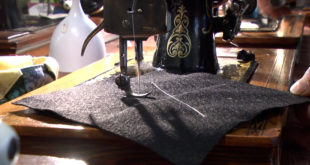December 18, 2018 – With the holiday season upon us, it’s also the season for greater fire risk. State Fire Marshal Kevin Sehlmeyer urges consumers to use caution as the holidays are a peak time for home fires caused by unattended candles and space heaters, electrical problems with worn lights, and dry Christmas trees.
“A dry tree is extremely flammable, and these types of fires can turn deadly within seconds, allowing you little time for your family to escape,” said Sehlmeyer. “Check the tree water everyday, don’t risk the chance of fire and the loss of family, friends or your home.”
According to the National Fire Protection Association:
- More than a third of home decoration fires are started by candles.
- 42 percent of decoration fires happen because decorations are placed too close to a heat source.
- One of every three home Christmas tree fires are caused by electrical problems.
- A heat source too close to the tree causes roughly one in every four fires.
- Nearly 50 percent of all space heater fires involve electric space heaters.
Sehlmeyer said that the top three days for home candle fires occur on Christmas Eve., Christmas Day, and New Year’s Day. “People often fall asleep or leave home with unattended candles left burning in many of these fires,” said Sehlmeyer. “Keep candles away from the tree, decorations, curtains and furniture that can catch fire. Always keep candles up high to prevent them from getting knocked over by children and pets. Battery operated, flameless candles are the safest option.”
Keep these fire safety tips in mind for a safe holiday season:
- Choose a fresh tree and water it daily.
- Place the tree away from any exit and at least three feet from any heat source (fireplaces, radiators, candles, heat vents or lights).
- NEVER USE LIT CANDLES TO DECORATE YOUR TREE.
- Use lights that are listed by a qualified testing laboratory for indoor or outdoor use appropriately.
- Replace any string of lights with worn or broken cords or loose bulb connections. Read manufacturers’ instructions for the maximum number of light strands to connect.
- Don’t overload electrical outlets or electrical outlet strips.
- Always turn off tree lights and extinguish candles when going to bed or leaving your home.
A live Christmas tree burn conducted by the U.S. Consumer Product Safety Commission shows just how quickly a dried-out Christmas tree fire burns, with flashover occurring in less than one minute, as compared to a tree watered regularly. Watch the video to see how Christmas tree fires can turn devastating and deadly within seconds.
“Be sure your smoke alarms are in working order, have a fire extinguisher readily available and know how to use it,” Sehlmeyer said. “Have a prepared and practiced home escape plan, with two ways out of your home that will help ensure your survival in a home fire.”
Please remember to test smoke alarms of elderly family members and neighbors when visiting them over the holidays. The Michigan Community Risk Reduction Task Force has identified that people over the age of 60 are at the greatest risk to die in residential fires in Michigan according to fire reports submitted for 2017-2018.
Four things that can reduce dying in a fire at your house:
- Check each smoke alarm monthly.
- Change smoke alarms every ten (10) years.
- Change the batteries in 9-volt smoke alarms every six (6) months.
- Install a smoke alarm on every level of your home and in every sleeping area.
If you have financial hardship and need smoke alarms, please contact the Bureau of Fire Services 517-241-8847.
The Bureau of Fire Services wishes everyone a safe and happy holiday season. Visit the Bureau of Fire Services website at www.michigan.gov/bfs for more fire safety information.
 Keweenaw Report Your Source for Local News and Sports
Keweenaw Report Your Source for Local News and Sports





